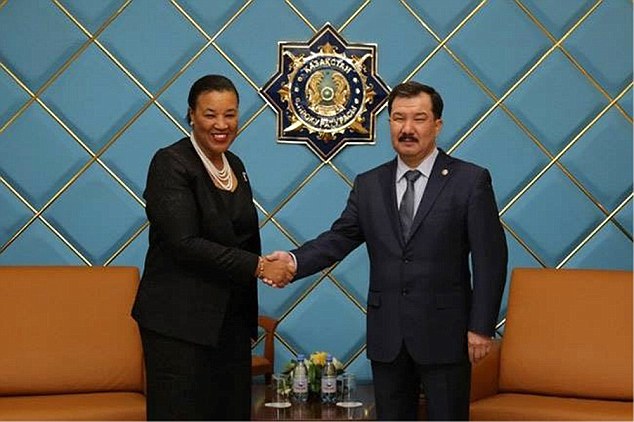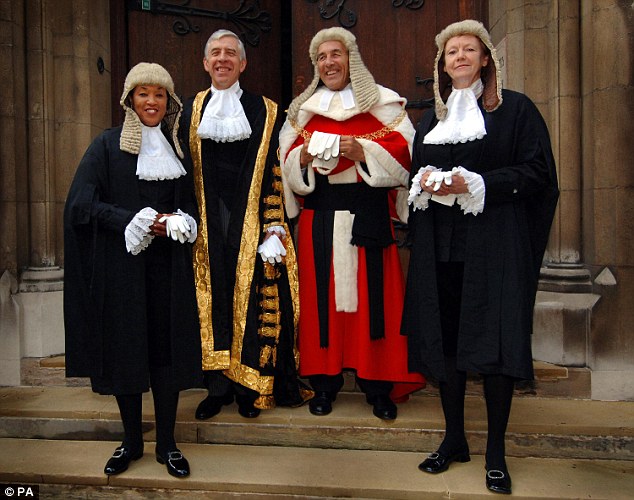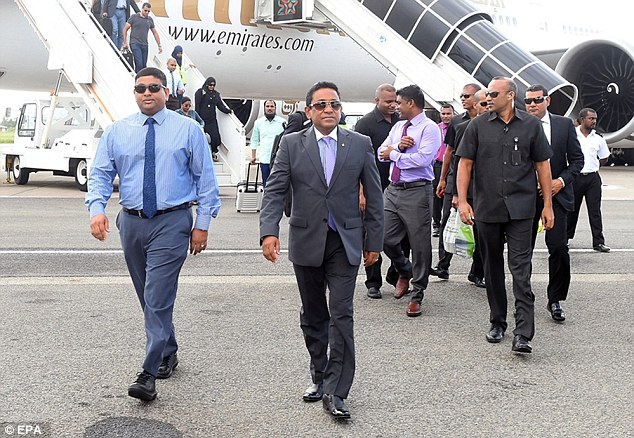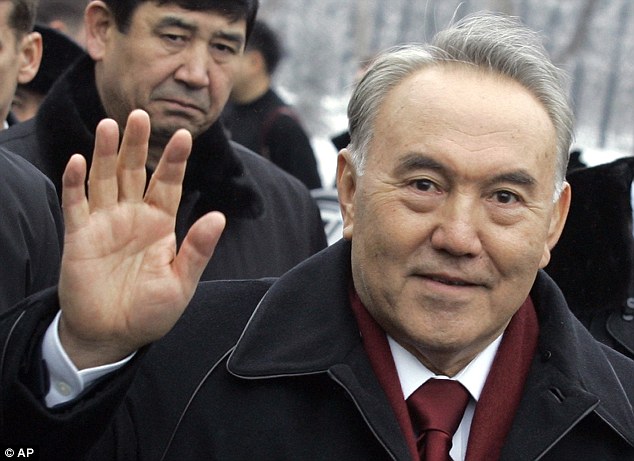 A coronation was staged last week, a stone’s throw from Buckingham Palace, amid the gilded splendour of Marlborough House, a former royal residence on The Mall.
A coronation was staged last week, a stone’s throw from Buckingham Palace, amid the gilded splendour of Marlborough House, a former royal residence on The Mall.
At a lavish ceremony featuring performances from a gospel choir, Caribbean dancers and a steel band, the New Labour peer Baroness Scotland of Asthal accepted one of the diplomatic world’s most prestigious jobs.
Clad in blue silk and a thick string of pearls, and applauded by hundreds of guests, including close friends Sir Trevor McDonald (the former ITN newscaster) and Cherie Blair, the former cabinet minister became Secretary-General of Her Majesty’s Commonwealth.
Previously, 60-year-old Baroness Scotland was best known for an unfortunate scandal which catapulted her on to the front pages in 2009, when she was serving as Gordon Brown’s Attorney General, or chief legal officer. It revolved around the revelation that she employed an illegal immigrant from Tonga called Loloahi Tapui as a cleaner, on a paltry wage of £6 an hour.
The wealthy peer was duly prosecuted for breaking immigration laws that she had helped draft, and fined £5,000.
Now she has a new job running the Commonwealth, which is set to thrust her back into the public eye.
As leader of the highly influential organisation, which unites Britain with 52 of its former colonies, she is required to spend the next four years working to uphold the Commonwealth Charter.
This hallowed document, which is signed by the Queen, ‘brings together the values and aspirations’ to ‘unite’ the Commonwealth’s member states. Central are three key principles: ‘Democracy, human rights and the rule of law’.
Baroness Scotland will be paid a salary of £158,757, plus pension and private health insurance. She will also enjoy the right to live in a four-storey grace-and-favour residence in Mayfair, and travel in a chauffeur-driven luxury car.
Not bad for a woman who hails from the very humblest of backgrounds.
The tenth of 12 children, Scotland was born in a tiny village on the Caribbean island of Dominica, came to the UK when she was two and grew up on the tough streets of Walthamstow, East London.
Now a Privy Councillor, she and her husband Richard Mawhinney — a fellow lawyer and the father of her two grown-up sons — own a £2 million house near the Thames in Chiswick, along with a cottage in the Cotswold village of Asthal.
Little wonder, perhaps, that she used her maiden speech to describe herself as a ‘classic child of the Commonwealth’ before (according to a Press release she later issued) describing her upwardly mobile life as ‘a journey of firsts’.
She was, the audience learned, successful enough to become ‘the first black woman to join the Queen’s Counsel in the United Kingdom’ in the early 1990s, and ‘the first woman to hold the position of UK Attorney General’ in 2007.
Now, she’s ‘the first woman Commonwealth Secretary-General’.
It’s all very admirable stuff. But in practice, not everyone is cheering Baroness Scotland’s landmark appointment.
The reason is that her high-flying career has, in recent years, seen her build often lucrative relationships with two of the world’s ugliest dictatorships.
One is the notorious government of Kazakhstan, whose repressive dictator, 75-year-old Nursultan Nazarbayev, has been accused of torturing and even killing political opponents, stifling Press freedom, and profiteering from the country’s vast oil and gas reserves.
The other is the despotic regime of Abdulla Yameen, the dictator of the Maldives, whose associates seized power in a 2012 coup and have since prosecuted more than 1,700 opposition activists while imprisoning the leaders of three opposition parties.
We shall explore these relationships in detail, along with the pressing question of how they can possibly now be squared with the Commonwealth’s supposed commitment to ‘democracy, human rights and the rule of law’.
Baroness Scotland, it should be stressed, insists there is no contradiction in her ties to these dictators and their regimes. Indeed, in a statement to the Daily Mail, she described herself as a ‘champion’ of human rights.
AdRecommendations powered by plista
But others strongly disagree. For example, the Human Rights Foundation, a prominent global campaigning organisation, tells me that her links to Kazakhstan ‘absolutely stink to high heaven’.
And Tory MP John Glen, who campaigns for democracy in the Maldives, a Commonwealth nation, describes Baroness Scotland’s work there as ‘outrageous’ and ‘shocking’.
Whatever one’s view, her relationship with the latter country has certainly been very lucrative. It stretches back to 2012, when the democratically elected president, Mohamed Nasheed, was deposed in a coup.
Soon afterwards, Baroness Scotland was hired to act as a legal adviser to the dubious regime that replaced him.

Her contract was later leaked to the Mail. It revealed that she was paid £7,500 per day to help find potential ways for the new government to escape censure from the Commonwealth, which was investigating its human rights abuses.
Baroness Scotland’s decision to take the job, which lasted for ten days, was branded ‘disgusting’ by Tory MP Karen Lumley. But it nonetheless had the desired effect: thanks in no small part to her work, the 2012 Commonwealth investigation was subsequently dropped.
Soon afterwards, it emerged that the Maldives’ Attorney General, Azima Shukoor, who had signed Baroness Scotland’s contract, had agreed to pay her a further £50,000, in addition to the £75,000 stipulated in her contract.
This second payment, described as a ‘bonus’ in a subsequent audit, was later found to be in breach of the Maldives constitution, not to mention its public finance act, and other public finance regulations.
Now, of course, the same Baroness Scotland who took this much-criticised job, helping the perpetrators of a coup avoid sanction by the Commonwealth, is running the same Commonwealth.
But that’s not all. Last summer, it emerged that she had also joined the ‘advisory board’ of Omnia Strategy, the law firm run by Cherie Blair. The move cemented a close friendship between the two women which stretches back decades.
Having first met the Blairs in legal circles when she was plain Patricia Scotland, she was one of the first Labour peers created after Tony Blair became PM, and in 1999 became a junior minister, completing her rise to the Cabinet in 2007.By the time she joined the advisory board of Omnia in 2015, Baroness Scotland was already campaigning to be elected Commonwealth Secretary-General.
Meanwhile, Mrs Blair’s law firm was busy carrying out PR and legal work for Abdulla Yameen’s unsavoury government, about which Amnesty International has ‘serious concerns’.
His regime has arrested hundreds of opposition activists, allowed journalists, human rights campaigners and opposition politicians to be prosecuted, extradited and subjected to death threats, and, Amnesty adds, allowed hard-line Islamic courts to force women who commit the supposed crime of ‘fornication’ to undergo ‘cruel, inhuman and degrading’ public floggings.
One of Omnia’s contracts, leaked to the Mail in February, showed that it was at the time earning £420,000 for six months’ work for its leader — the equivalent of £2,000 per day.
More than £200,000 of that fee, which was invoiced to a government quango at the centre of a £50 million corruption scandal, was paid to Omnia by an entirely separate private company, at the behest of an international fugitive wanted by Interpol for alleged embezzlement.
Perhaps more controversially still, Baroness Scotland’s close links to the Maldives and Abdulla Yameen’s regime appear to have followed her not just to Omnia but also to the Commonwealth.
I can reveal that one of the first people she chose to hold meetings with after taking office as Secretary-General on April 1, was the aforementioned politician Azima Shukoor — the dictatorship’s former Attorney General who, back in 2012, had been responsible, you will recall, for signing off on Scotland’s £75,000 contract and unlawfully paying her the further £50,000.
Ms Shukoor visited London last week and met Baroness Scotland as a ‘special envoy’ of Abdulla Yameen, the President.
What cosy circles the Baroness and her despotic associates move in!
More intriguingly still, Baroness Scotland decided to take this hitherto secret meeting (which was not made public by the Commonwealth) at a time when the Maldives faces potential sanctions from her own organisation.
Later this month, the Commonwealth Ministerial Action Group (CMAG), which polices human rights abuses in member states, will meet to consider disciplinary steps against the Maldives. All of which strikes informed observers as a touch rum.
‘Baroness Scotland’s role at the Commonwealth and her paid work for the corrupt Maldivian government is an outrageous conflict of interests,’ says John Glen MP.
‘That she has also been on the advisory board of Omnia, which has represented the Maldivian government, is equally shocking. The key decision of whether the Commonwealth action group will pursue an investigation into the Maldives shouldn’t be influenced by an individual who has had a previous dubious involvement with the regime, and faces such a clear conflict of interest.’
For her part, Baroness Scotland denies any wrongdoing, telling me that she did indeed meet Shukoor last week. The meeting had been set up by her predecessor. She also later met with representatives of the country’s exiled opposition.
Last night, she issued a statement insisting that ‘all her work for the Maldives government was entirely consistent with the Commonwealth’s approach at the time’ and denying that her 2012 employment contract with the dictatorship involved her being hired to ‘advocate for one side or the other’.
She also denied ever having done any work, ‘paid or unpaid’, for Omnia Strategy, despite being listed on its website until last month as a member of the firm’s ‘advisory board’.
Finally, she insisted that she would have no influence over whether the Commonwealth decides to discipline the country later this month.

‘Any decision on the Maldives will be made by the Commonwealth Ministerial Action Group and not the Secretary-General. The Secretary-General is not a member of CMAG,’ the statement read.
We must, of course, take her at her word.
However, the Maldives isn’t the only murky dictatorship with which the Commonwealth’s new Secretary-General has concerning links. She also appears to be close chums with the despotic government of oil-rich Kazakhstan.
The country is another bete noir of human rights campaigners where, according to Amnesty, there is ‘impunity for torture’ and where ‘freedoms of expression, association and peaceful assembly continue to be restricted’.
Its ruling dictator, Nursultan Nazarbayev, who has no ‘credible opposition’, has ‘forcibly closed’ newspapers which criticise him, and allowed anti-government protestors to be arrested, tortured and even killed.
Despite Kazakhstan’s apalling track record, Baroness Scotland visited the country in February, weeks before taking office at the Commonwealth, on what was somewhat opaquely described by the regime as a ‘working visit’.
It provided a PR coup for Nazarbayev’s regime, whose official news agency circulated photographs to the domestic media of her shaking hands with senior politicians.
One state-sanctioned press release claimed that a ‘meeting of Prime Minister of the Republic of Kazakhstan Karim Massimov and Secretary-General of Commonwealth Nations Baroness Patricia Janet Scotland’ had resulted in them deciding on a ‘strengthening of the mutual relationship’ between the UK and Kazakhstan.
It was the second time in recent months that Baroness Scotland had glad-handed leaders of the regime (whose paid advisers, incidentally, have included her friends Tony Blair and his No 10 press spokesman Alastair Campbell).
Last November, the country’s prosecutor-general visited London, where he was also invited to meet the baroness. Again, the meeting was considered a PR coup by the regime of the despotic president, who was elected with more than 97 per cent of the vote.
A press release promptly published by the state media described Scotland as a ‘prominent public figure of Britain’.
It added (somewhat laughably) that the meeting had been devoted to the representative of the Kazakh government informing her ‘about the latest achievements of the state in the field of human rights’, and claimed she had ‘expressed support’ for the Kazakh regime’s policies in this field.

Intriguingly, given these meetings, Baroness Scotland has also, for most of the past year, maintained a curious business relationship with a company named Arcanum, a secretive private investigation firm based in Zurich, which she quit days before taking office this month. It has described her as one of its ‘senior advisers’.
The company offers ‘bespoke and tailored strategic intelligence products to government entities and the private sector across a range of industries’ and counts among its many lucrative clients the Government of — surprise, surprise, Kazakhstan.
What is more, Ron Wahid, the founder of Arcanum and an American citizen, was revealed by Private Eye magazine last summer to be helping finance Baroness Scotland’s campaign for election as the Secretary-General of the Commonwealth. In Private Eye’s article, he was described as ‘a Zurich-based financier and sometime polo player with a taste for private jets’.
Private Eye further reported that Arcanum ‘has been mentioned in connection with a number of questionable activities, notably, a plan to kidnap Alma Shalabayeva, the wife of Kazakhstani opposition politician Mukhtar Ablyazov, and her daughter, in Rome’.
Meanwhile, in early 2015, Intelligence Online — a sort of bible for the corporate intelligence industry — revealed the existence of leaked documents showing that Arcanum had been hired by the Kazakh dictatorship to investigate another of its political opponents, Viktor Khrapunov, the former Mayor of the capital city, Almaty.
Arcanum would not comment on the specifics of these allegations when I called this week, though it did confirm that it had worked for the Kazakh dictatorship.
All of which makes it, shall we say, a ‘colourful’ firm for the Commonwealth’s Secretary-General to have been so closely involved with. Little wonder that informed observers smell something fishy.
‘The recent visit of Patricia Scotland to Kazakhstan absolutely stinks. It stinks to high heaven,’ comments Thor Halvorssen of the Human Rights Foundation.
‘Here you have a former British government official, about to head the Commonwealth. And yet, immediately prior to taking office as Secretary-General, she is acting as consultant for Arcanum, which is carrying out detective work for the vile regime of Nazarbayev.
‘Then, literally days before taking office, she flies to Kazakhstan.
‘It is remarkable that she has just magically visited the country, at a time when a firm she works for is involved in ongoing work for its dictator.
‘For what reason is she there? The last time I checked, Kazakhstan was not part of the Commonwealth. What on earth did she think she was doing?’
Asked about the matter, Baroness Scotland’s spokesman told the Mail that it was an unpaid visit organised to ‘talk about civil and criminal justice reform, something on which she is widely recognised to be an international expert’.
The spokesman vigorously denied that her trip to Kazakhstan had anything to do with Arcanum, saying: ‘She has not done any work, paid or unpaid, for Arcanum in Kazakhstan, nor have they facilitated any meetings, formally or informally, on her behalf.
Strangely, however, this version of events was swiftly and explicitly contradicted by Arcanum’s founder, Mr Wahid.
‘At the time of her visit to Kazakhstan, Baroness Scotland was a serving senior adviser to Arcanum, which has links with a number of sovereign governments, including Kazakhstan,’ he told me in a statement.
‘During visits towards the end of her tenure of office as senior adviser, Baroness Scotland held a number of meetings on behalf of Arcanum in relation to Arcanum’s ongoing business activities in Kazakhstan.’
Immediately after receiving Mr Wahid’s written statement, the Mail contacted the Commonwealth seeking an explanation as to why it was at odds with Baroness Scotland’s testimony.
Half an hour later — hey presto! — a spokesman for Arcanum called saying that their aforementioned testimony, which described in some detail how Baroness Scotland had worked for it in Kazakhstan, had actually been issued in error.
Due to what the firm called a ‘misunderstanding’, the first statement contained ‘completely false’ information, said the spokesman.
In fact, the Arcanum spokesman now said, Baroness Scotland’s visit to Kazakhstan had nothing whatsoever to do with Arcanum.
What a sloppy mistake for the private investigation company to make! How embarrassing, for all concerned, for them to change their story so suddenly once the Mail started asking questions.
Whatever really went on, Her Majesty’s Commonwealth in theory remains an organisation committed to three fundamental principles: ‘Democracy, human rights and the rule of law’.
Would it not, therefore, have been desirable — and might such embarrassment have be avoided — if the Commonwealth’s high-profile new leader did not have such unsavoury links to some of the world’s ugliest despots?
THE DAILY MAIL, 16 April 2016




